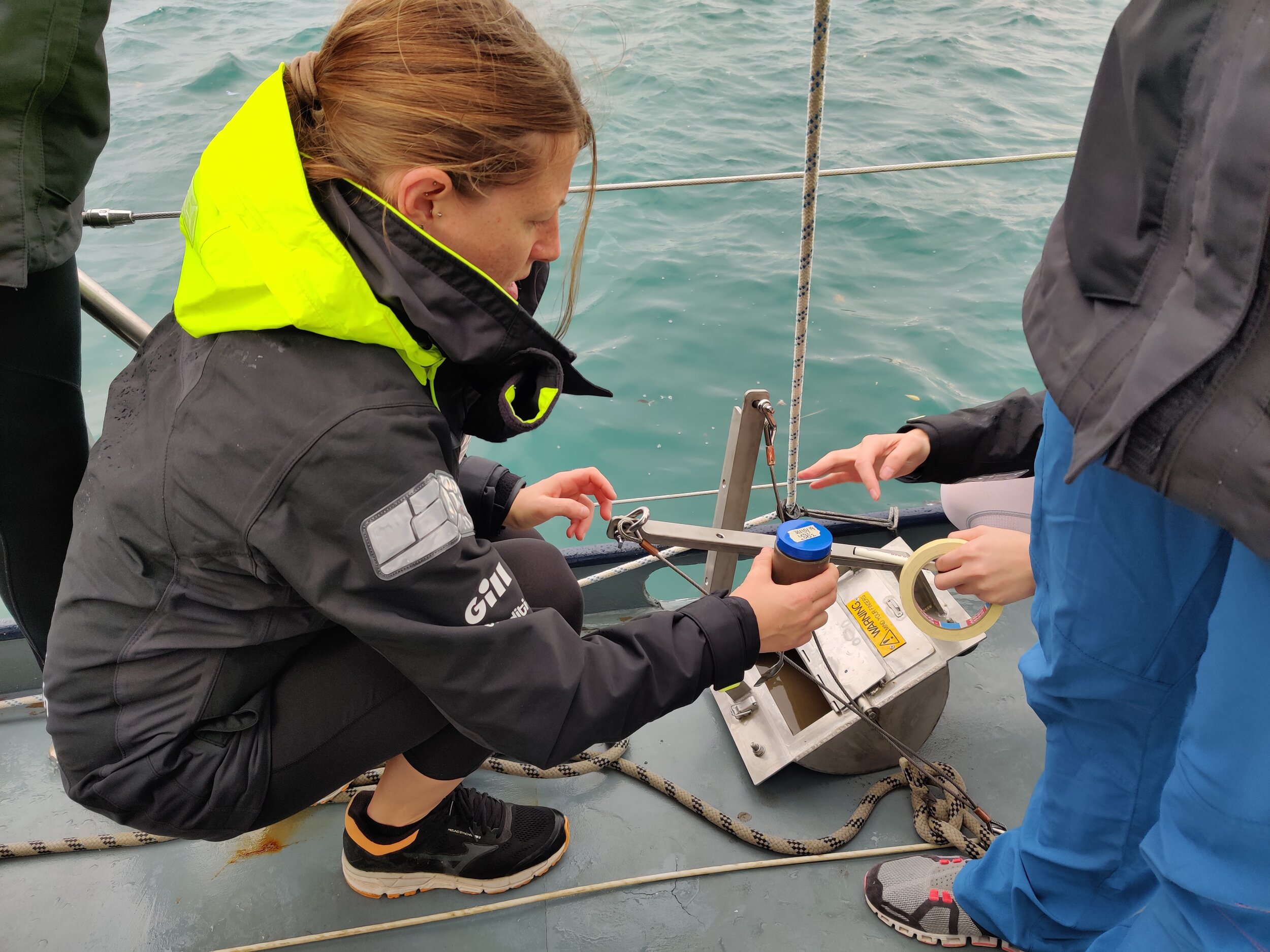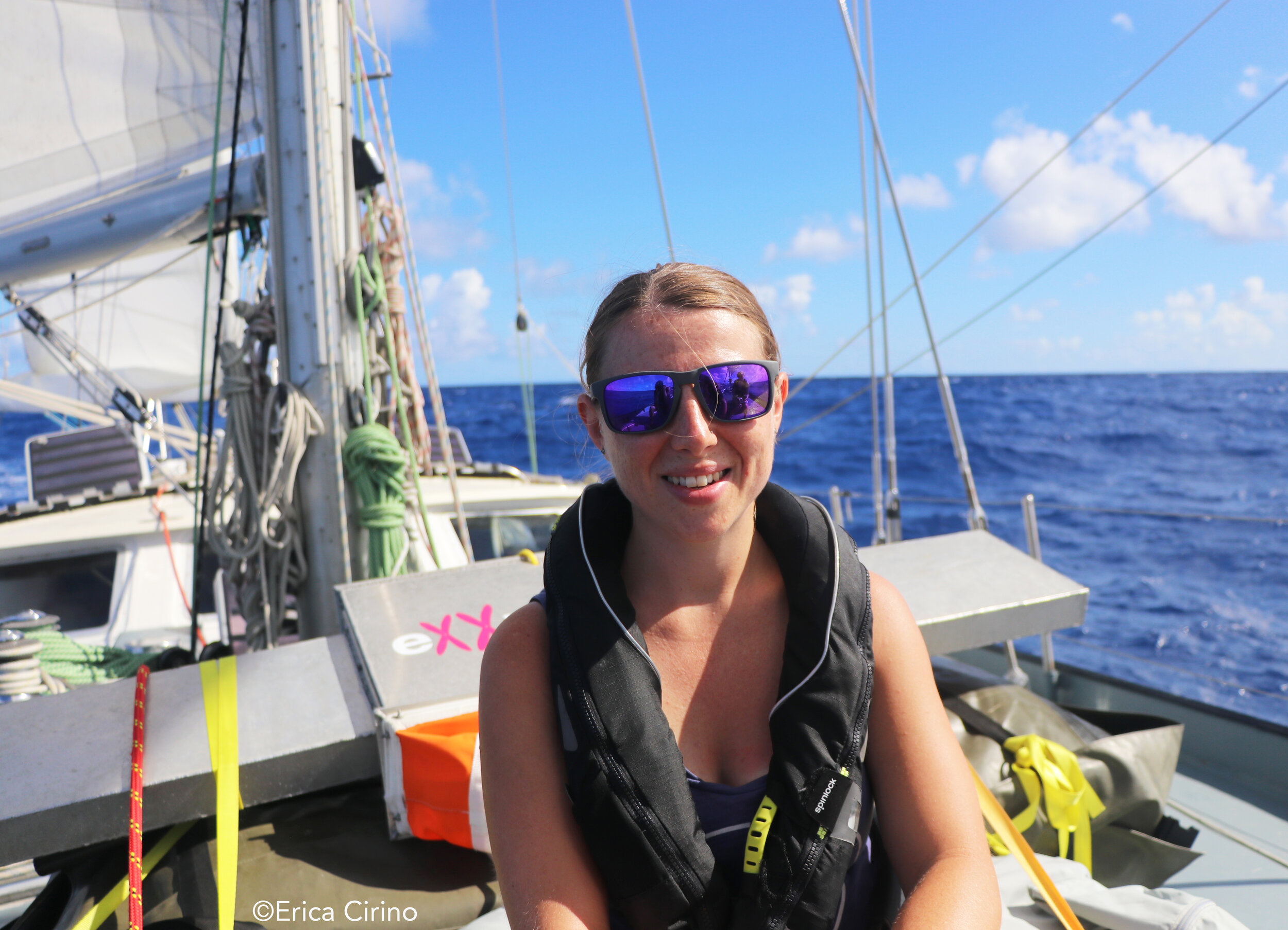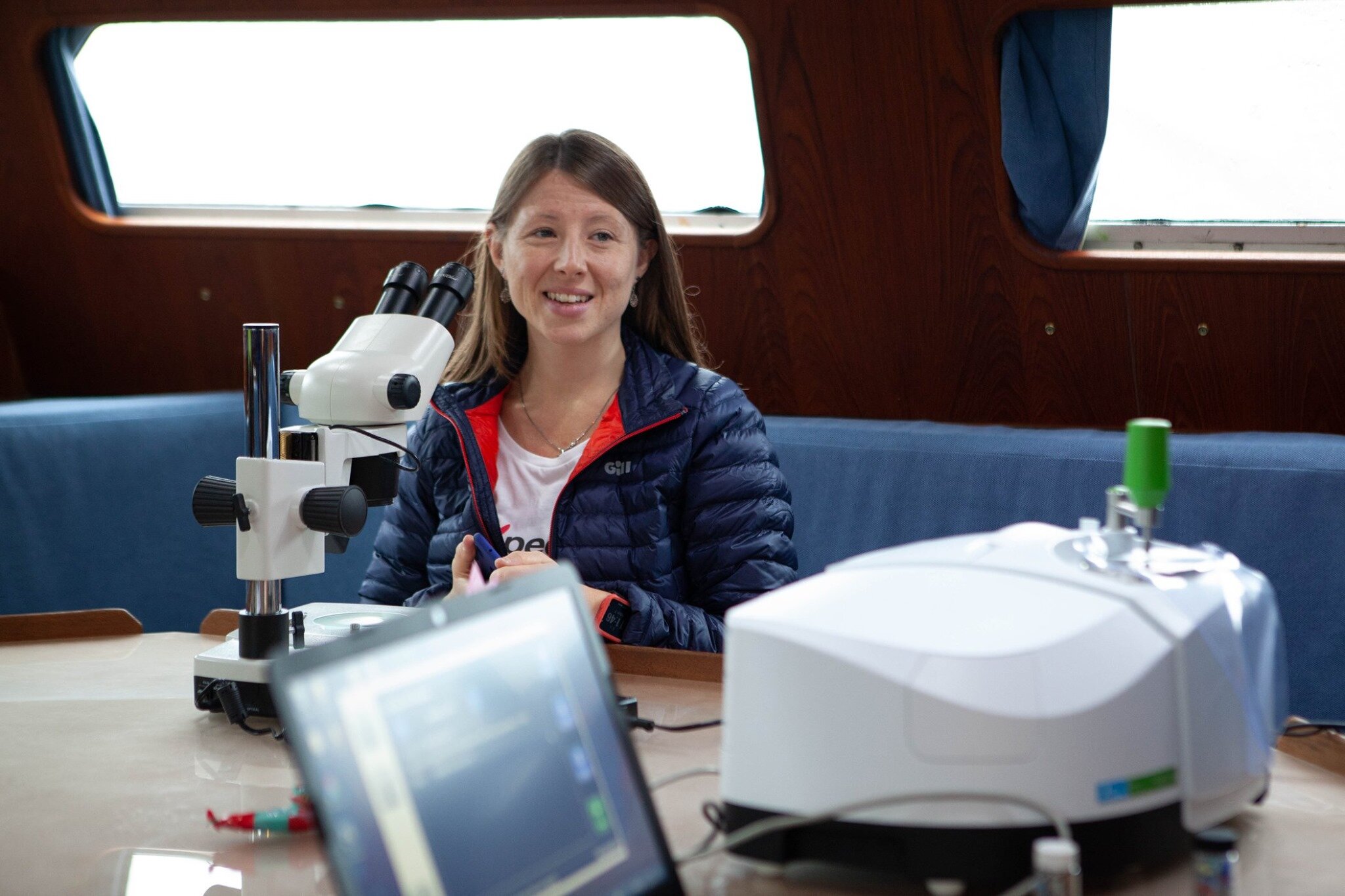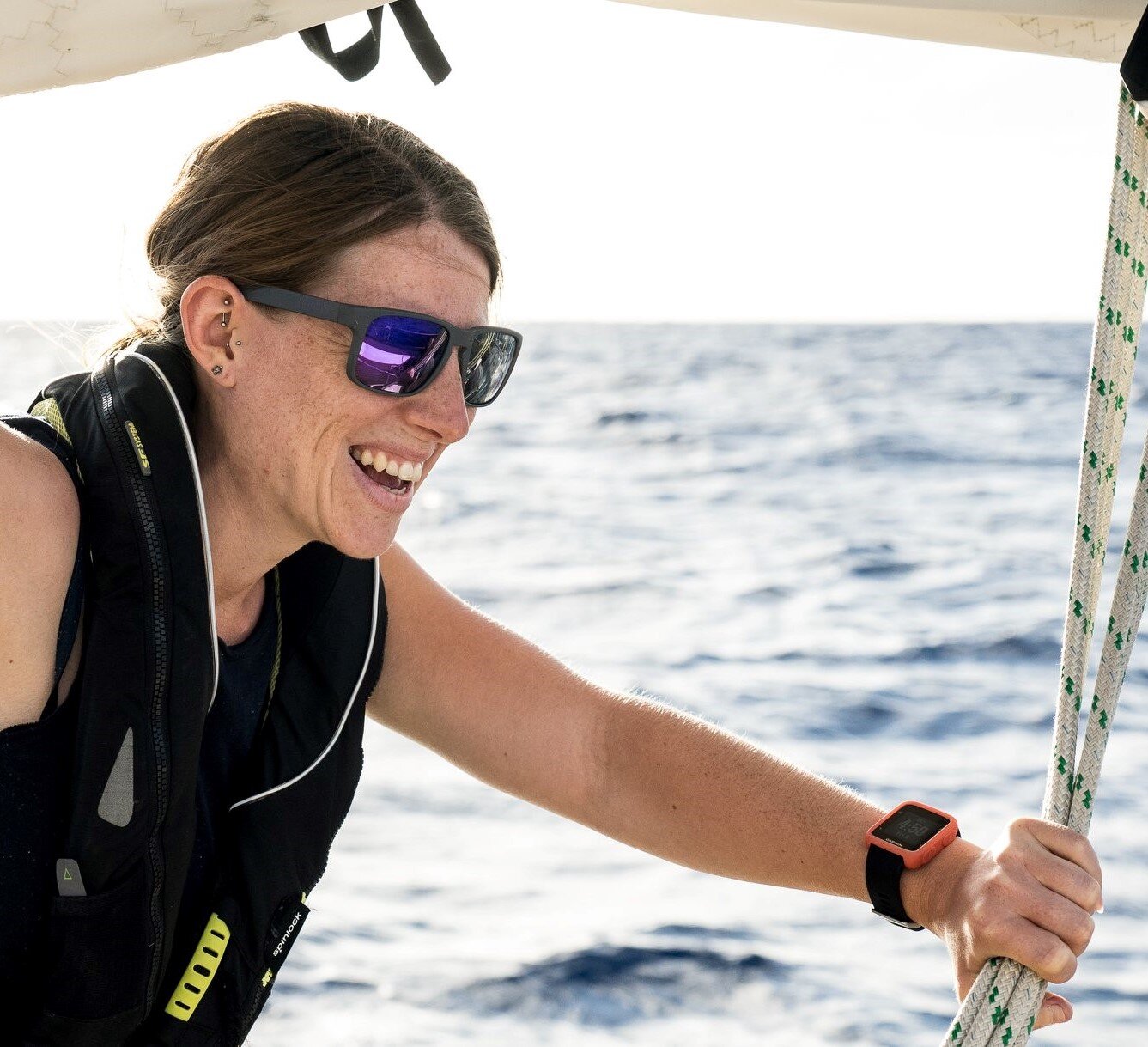Women in the Lab: An Interview with Dr. Winnie Courtene-Jones, plastic pollution expert
BY DANA TRICARICO
Meet Dr. Winnie Courtene-Jones, a plastic pollution expert working within the University of Plymouth’s International Marine Litter Research Unit, where she leads scientific investigation for eXXpedition, an all-female team sailing around the world researching plastic pollution. Her experience focusses on quantifying microplastics in the aquatic environment, researching sources and flows of plastic litter and their fate within the marine ecosystem and providing evidence to support appropriate solutions to plastic waste.
Her scientific investigations has led her to study plastic pollution in a variety of environments from the coastline to some of the remotest part of our ocean including the deep sea and ocean gyres. Winnie has attended UK and European Parliament as an invited expert on microplastics. She has a strong academic record of accomplishment with a number of scientific publications and invited presentations at conferences. Additionally she is passionate about disseminate science through varied public outreach channels and actively supports initiatives encouraging women in STEM subjects.
I noticed that you received your Bachelor’s degree at the University of Wales, Bangor. What did you study there, and did you always know that your career trajectory would lead you to marine science?
My Bachelor’s degree was in Zoology with animal behavior. I have always been fascinated by the natural world and I wanted to keep my degree broad to gain an understanding of the environment as a whole. It wasn’t until I learnt to SCUBA dive with the Bangor University sub-aqua club, during the final year of my degree, that my eyes truly opened up to the underwater world. Couple this with volunteer work over the summer at a dolphin research organization in my hometown in Wales (yes, that’s right there’s a large population of dolphin resident off the west Wales coast!) and I was well and truly hooked on marine science and learning as much as I could about this world below the waves.
Can you tell us more about your position as the eXXpedition Round the World Science Lead and what a typical day might look like?
Currently I am a research fellow at the University of Plymouth where my role is ‘science lead’ for eXXpedition Round the World. This is an all-female scientific sailing voyage circumnavigating the world studying plastic pollution.
The job is extremely varied, from developing the multi-disciplinary research program, spending time at sea collecting samples and leading voyage legs of the expedition and working back in the University laboratory to analyse samples, interpret data and disseminate the results.
I don’t think I have a ‘typical day’ as it varies so much depending on whether I am in the field, the lab, or the office (currently my living room during COVID-times). While in the field, crew members are divided into teams which rotate in 4-hour watch shifts through the night- as we always need hands on deck. Then during the day we collect samples for the different scientific investigations, so this could be using the manta trawl, NISKIN bottles and sediment grab to take environmental samples or performing observations to study distributions of large litter in the ocean for example. I also run workshops with the crew to explore our role in being part of the solution to plastic waste. Back at the University of Plymouth, we have an ultra-clean microplastics laboratory where I processes samples, using different equipment to analyses the samples in different ways to answer the different scientific questions we are asking.
How do you hope that your current work will help contribute to a positive impact in this field?
I hope that this will work bring a positive impact in a number of ways. Firstly as I scientist I am driven by a quest for knowledge, and the research being undertaken aims to expand and drive forwards our understanding about plastic pollution. Secondly, by providing this scientific and evidence-based data I hope that we can effect positive change at various levels (from individuals and communities up to policy and industry) to do things in a more sustainable way. Thirdly, I hope to inspire others; I am really passionate about encouraging women into science, and more generally supporting women to realize their potential regardless of which discipline or role this is in. My aspiration is that by having strong and positive female role models, as exemplified by eXXpedition round the world, this enthuses others to dream big and reach their goals. For me, this is especially important when we land in each of the different countries we visit along our journey, and I take a lot of time to speak with schools, universities, and members of the public about this.
A lot of our Women in Ocean Science (WOS) community is struggling with the uncertainties brought on by covid-19. Have you been able to go back into the lab and continue research? If so, how is your time in the lab different than pre-covid research?
At the start of this year I set sail with eXXpedition on two of their voyages legs back to back. Leaving the UK in early January and hearing the situation develop while we were onboard- with limited communications (and no wifi) and then reaching land and disembarking was a strange feeling. I arrived back into the UK in March, and that very week the University closed and the UK went into lockdown. This put a hold on laboratory work. However, on-board the eXXpedition yacht we have a bench-top FTIR made by PerkinElmer– this is a scientific instrument that enables us to analyse the plastics we collect and work out their composition. We were able to bring this back to the UK from the boat, and so I was able to analyse some of the samples collected while at home- adapting my living room into a laboratory!
I have recently (in August) got back into the University laboratories, there are strict protocols in place, with anyone on site taking extra precautions and following the new systems (e.g. one-way access, social distancing, scheduling lab use in advance, limited numbers in labs etc.), but it’s great being back and working on the samples.
There are challenges and uncertainties posed by the pandemic, and I think the main thing is adjusting to a slightly slower pace of work (and life). I feel that everyone is figuring out what their ‘new normal’ looks like and it is really important to treat yourself and others with compassion.
Before taking up this role, you were pursuing your PhD studying microplastic pollution in the deep sea, can you tell us more about this research?
During my PhD I researched microplastic pollution in the deep-sea ecosystem. Here I documented different benthic invertebrates (organisms which live on the seafloor), such as sea snails, starfish and brittle stars, living over 2000 m below the sea surface, to ingest microplastics. What was more startling was that the amount of microplastics inside them was comparable to species living around our coastlines illustrating that even the most remote locations, perceived as far away from human activity, are polluted with plastics. I went on to document microplastics also in deep- ocean water and sediments, again at similar concentrations to those found in coastal waters.
My most interesting research found that deep-sea starfish, which had been collected in the mid-1970 (and preserved intact in an archive collection) contained microplastics. This was surprising as the mass production of plastics only began in the mid-1940s/50s.
You can read all my research on my ResearchGate profile
How can the general public be advocates for our ocean, specifically as it relates to marine plastic pollution?
It can be quite overwhelming to know what to do to make a positive impact on the world around us. There are many actions we can all take from eating sustainable seafood, voting for leaders with an environmental agenda and purchasing fewer clothes and avoiding ‘fast fashion’ (did you know the majority of textiles are made of synthetic i.e. plastic, fibers which can shed during wear and washing or after disposal).
To find effective actions you can take to tackle plastic pollution, there is a great free online platform called SHiFT, which can help you identify your role in protecting the ocean. Why not check it out?
The marine science field can be a difficult one for those starting out. Could you give some advice to those in our WOS community who may be struggling to break into this field?
I have a few pieces of advice for aspiring marine scientists:
Get involved: gain new experiences and skills outside of your studies but also know your worth. You could volunteer, organize local beach cleans or community events or gaining new qualifications (such as sailing, SCUBA diving etc).
It’s so important to be doing what you love so follow you passion, but remain open to new experiences. There’s no one career path that works for everyone and life doesn’t always take the most obvious path. Sometimes it is surprising opportunities that bring the biggest rewards, or that broaden you knowledge and contact base – which could be valuable in the future.
Build a network: being part of a community of likeminded people is a great way be empowered and supported while also learning about different careers and opportunities, making professional contacts and developing collaborations.
The big question- what is your favorite marine animal??
Now this is a tricky one, I love seastars and I studied ingestion of microplastics in deep-sea starfish and brittlestars during my PhD; but octopus also totally mesmerize me, their intelligence, fluidity in the water and their behavior (where they can change shape and the texture of their skin) are truly incredible.









